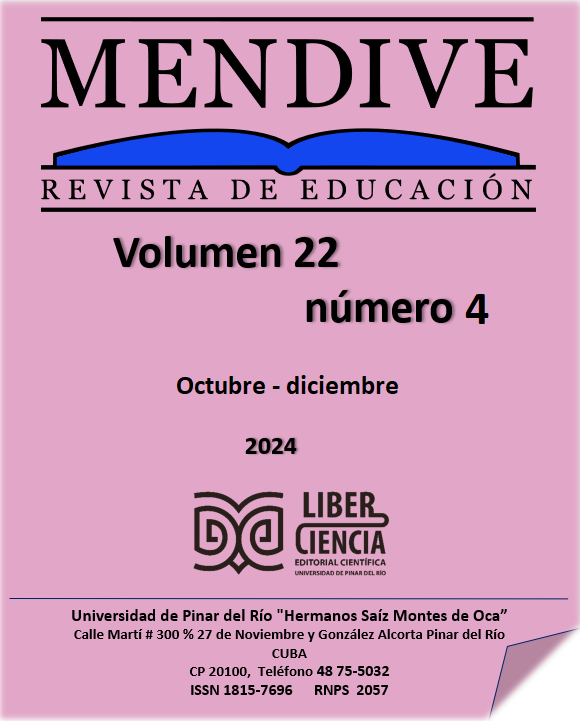Skills related to the operationalization of variables in university curricular research
Main Article Content
Abstract
The methodology of scientific research constitutes one of the pillars of university teaching, in the formulation of technical solutions to various scientific and professional problems. The identification and operationalization of variables is one of the guiding threads of the research process, and the development of skills for this purpose is vital. The objective of the work was to carry out an analysis of the improvement of research skills related to the operationalization of variables in students of the Pedagogy of National and Foreign Languages and Pedagogy of Experimental Sciences, Computer Science careers of the Faculty of Philosophy, Letters and Education Sciences at the Central University of Ecuador, during the second academic period of the year 2023. A mixed research with a transversal design was developed, using theoretical methods such as historical and systemic and empirical methods such as: observation, through a questionnaire; measurement with non-parametric descriptive and inferential statistics; and a quasi-experiment with the application during the academic period, of a program in which the content of variables was considered as a guiding and integrating axis of the rest of the content. The measurement carried out before the application of the program (pretest) indicated average levels in all the parameters considered in the questionnaire, which improved in the posttest, with significant differences in most based on the Wilcoxon signed rank test. The management of the variables as a guiding and integrating axis of the teaching of the subject of Scientific Research Methodology was positive in the group of selected students.
Downloads
Article Details

This work is licensed under a Creative Commons Attribution-NonCommercial 4.0 International License.
References
Arias González, J. (2021). Guía para elaborar la operacionalización de variables. Espacio I+D: Innovación más Desarrollo, 10(28), 42-56. https://doi.org/10.31644/IMASD.28.2021.a02
Balletbo, I., y Balletbo, J. (2022). Relación de la investigación científica con la construcción de aprendizajes significativos de la carrera de Administración de Empresas. ScienteAmericana, 9(2), 123-134. https://doi.org/10.30545/scientiamericana.2022.jul-dic.4
Brown, S. (2019). Subjectivity in the Human Sciences. Psychological Record, 69(4), 565-579. https://doi.org/10.1007/s40732-019-00354-5
Charalambous, M., Hodge, J., y Ippolito, K. (2021). Statistically significant learning experiences: towards building self-efficacy of undergraduate statistics learners through team-based learning. Educational Action Research, 29(2), 226-244. https://doi.org/10.1080/09650792.2020.1782240
Clavijo, W., Delgado, A., Parra, H., Fernández, A., y Chicaiza, O. (2017). Percepción estudiantil sobre habilidades de investigación en la Universidad de las Fuerzas Armadas ESPE. Lecturas: Educación Física y Deportes (EFDeportes.com), 22(232), 1-12. https://www.efdeportes.com/efd232/percepcion-estudiantil-sobre-investigacion-en-espe.htm
Díaz, T., Paredes, I., Bolaño, Y., y Machado, R. (2020). Diagnóstico inicial en la impartición de la asignatura Metodología de la investigación. Estudio de caso. Serie Científica de la Universidad de las Ciencias Informáticas, 13(10), 1-12. https://publicaciones.uci.cu/index.php/serie/article/view/638
Espinoza, E. (2019). Las variables y su operacionalización en la investigación educativa. Segunda parte. Conrado, 15(69), 171-180. https://conrado.ucf.edu.cu/index.php/conrado/article/view/1052
García-Carmona, A., y Toma, B. (2024). Integration of Engineering Practices into Secondary Science Education: Teacher Experiences, Emotions, and Appraisals. Research in Science Education, 54(4), 549-572. https://doi.org/10.1007/s11165-023-10152-3
González, M., Marín, L., y Fernández, A. (2020). La formación del espíritu investigativo en los estudiantes universitarios. Efdeportes. Lecturas: Educación Física y Deportes, 25(268), 1-7. https://www.efdeportes.com/efdeportes/index.php/EFDeportes/article/view/2420/1282
Hernández Sampieri, R., Fernández, C., y Baptista, P. (2020). Metodología de la Investigación. Mc Graw Hill.
León, R., Hernández, A., y González, S. (2023). El trabajo investigativo de los estudiantes en el proceso de enseñanza aprendizaje de la Matemática. Revista Cubana de Educación Superior, 42(3), 37-51. https://revistas.uh.cu/rces/article/view/8489
Regueira, D., Calzada, D., y Fernández, A. (2018). La formación docente del estudiante universitario para que aprenda a enseñar. Una propuesta innovadora. En J. Almuiñas, J. Galarza, y J. López, La innovación en la gestión universitaria (Experiencias y alternativas para su desarrollo) (págs. 277-295). RED-DEES.
Rodríguez, C., Breña, J., y Esenarro, D. (2021). Las variables en la Metodología de la Investigación Científica. Editorial Área de Innovación y Desarrollo, S.L. https://doi.org/10.17993/IngyTec.2021.78
Toala-Toala, G., y Mendoza, A. (2019). Importancia de la enseñanza de la metodología de la investigación científica en las ciencias administrativas. Dominio de las Ciencias, 5(2), 56-70. https://doi.org/10.23857/dom.cien.pocaip.2019.5.2.abril.56-43
Velázquez, M., Amat, M., y Mena, M. (2020). La epistemología y la metodología de la investigación en la carrera de Derecho. CONRADO. Revista pedagógica de la Universidad de Cienfuegos, 16(SI), 95-102. https://conrado.ucf.edu.cu/index.php/conrado/article/view/1527/1511


